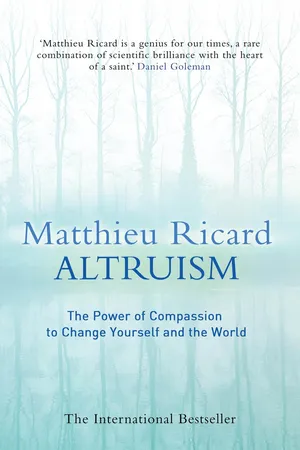
- English
- ePUB (mobile friendly)
- Available on iOS & Android
About this book
In Happiness, Matthieu Ricard demonstrated that true happiness is not tied to fleeting moments or sensations, but is an enduring state of soul rooted in mindfulness and compassion for others. Now he turns his lens from the personal to the global, with a rousing argument that altruism - genuine concern for the well-being of others - could be the saving grace of the 21st century.
Altruism is, he believes, the vital thread that can answer the main challenges of our time: the economy in the short term, life satisfaction in the mid-term, and environment in the long term. Ricard's message has been taken up by major economists and thinkers, including Dennis Snower, Amartya Sen, Joseph Stiglitz, and George Soros.
Matthieu Ricard makes a robust and passionate case for cultivating altruistic love and compassion as the best means for simultaneously benefitting ourselves and our society. It's a fresh outlook on an ardent struggle - and one that just might make the world a better place.
Tools to learn more effectively

Saving Books

Keyword Search

Annotating Text

Listen to it instead
Information
Table of contents
- Also by Matthieu Ricard
- Altruism
- Contents
- Introduction
- 1 The Nature of Altruism
- 2 Extending Altruism
- 3 What Is Empathy?
- 4 From Empathy to Compassion in a Neuroscience Laboratory
- 5 Love, Supreme Emotion
- 6 The Accomplishment of a Twofold Benefit, Our Own and Others’
- 7 Self-Interested Altruism and Generalized Reciprocity
- 8 Selfless Altruism
- 9 The Banality of Good
- 10 Altruistic Heroism
- 11 Unconditional Altruism
- 12 Beyond Imitations, True Altruism: An Experimental Investigation
- 13 The Philosophical Arguments Against Universal Selfishness
- 14 Altruism in Theories of Evolution
- 15 Maternal Love, Foundation for Extended Altruism?
- 16 The Evolution of Cultures
- 17 Altruistic Behavior Among Animals
- 18 Altruism Among Children
- 19 Prosocial Behavior
- 20 Can We Change?
- 21 Training the Mind: What the Cognitive Sciences Have to Say
- 22 How to Cultivate Altruism: Meditations on Altruistic Love, Compassion, Joy, and Impartiality
- 23 Egocentrism and Crystallization of the Ego
- 24 The Spread of Individualism and Narcissism
- 25 The Champions of Selfishness
- 26 Having Hatred or Compassion for Yourself
- 27 The Shortfall of Empathy
- 28 At the Origin of Violence: Devaluing the Other
- 29 The Natural Repugnance to Kill
- 30 Dehumanizing the Other: Massacres and Genocides
- 31 Has War Always Existed?
- 32 The Decline of Violence
- 33 The Instrumentalization of Animals: A Moral Aberration
- 34 Backfire: Effects of the Meat Industry on Poverty, Environment, and Health
- 35 Institutionalized Selfishness
- 36 The Virtues of Cooperation
- 37 An Enlightened Education
- 38 Fighting Inequality
- 39 Toward a Caring Economy
- 40 Voluntary, Joyous Simplicity
- 41 Altruism for the Sake of Future Generations
- 42 Sustainable Harmony
- 43 Local Commitment, Global Responsibility
- Conclusion: Daring Altruism
- Acknowledgments
- Karuna-Shechen: Altruism in Action
- Notes
- Sources for Figures
- Select Bibliography
- About the Author
Frequently asked questions
- Essential is ideal for learners and professionals who enjoy exploring a wide range of subjects. Access the Essential Library with 800,000+ trusted titles and best-sellers across business, personal growth, and the humanities. Includes unlimited reading time and Standard Read Aloud voice.
- Complete: Perfect for advanced learners and researchers needing full, unrestricted access. Unlock 1.4M+ books across hundreds of subjects, including academic and specialized titles. The Complete Plan also includes advanced features like Premium Read Aloud and Research Assistant.
Please note we cannot support devices running on iOS 13 and Android 7 or earlier. Learn more about using the app